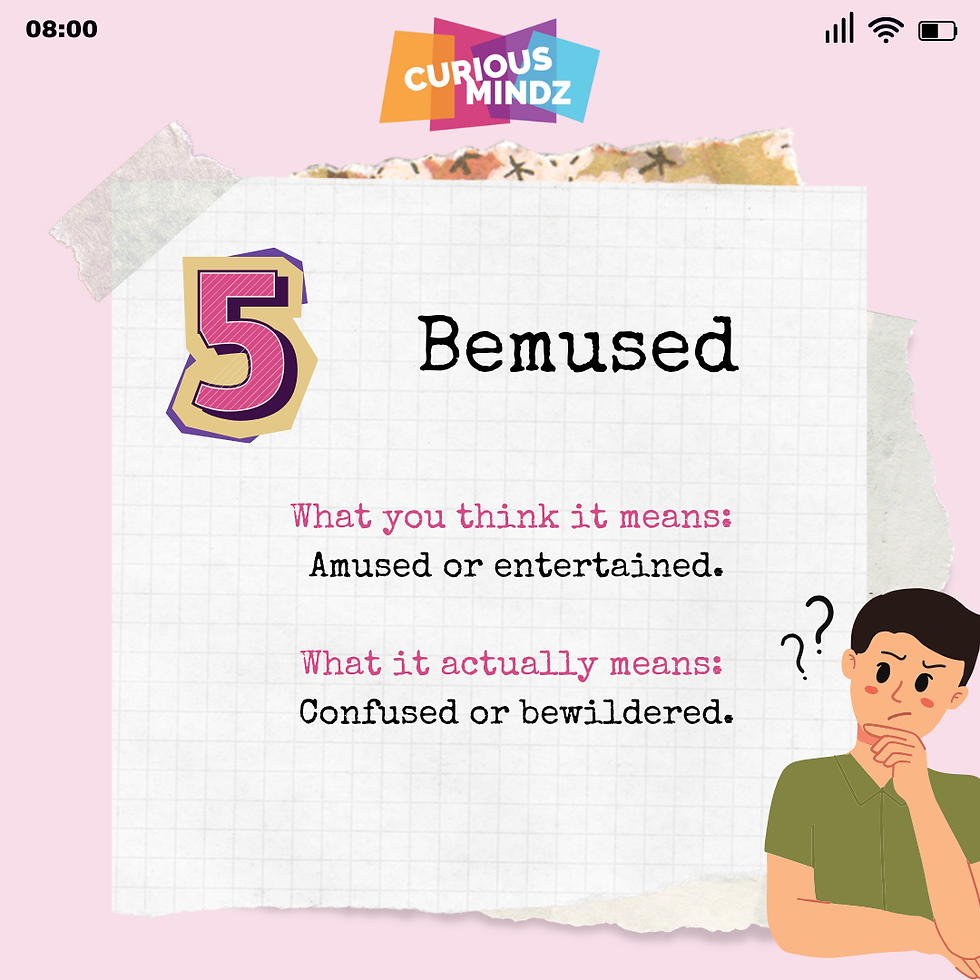5 English Words That Don’t Mean What You Think
- Curious Mindz

- Jan 10
- 2 min read

The English language is a treasure trove of fascinating quirks and one of its most delightful mysteries is how words often don't mean what we think they do. Over time, meanings shift, evolve or get misunderstood, leading to widespread misconceptions. Let’s dive into five such words and uncover their true meanings.
Decimate

What you think it means: To completely destroy.
What it actually means: To reduce by one-tenth.
The word “decimate” originates from the Latin word decimare, a Roman military term referring to the practice of killing one in every ten soldiers in a mutinous group as punishment. While it’s now often used to mean widespread destruction, its original meaning was far more specific—and less apocalyptic.
Literally

What you think it means: Something that is absolutely true and factual.
What it actually means: Used for emphasis, sometimes even when not literally true.
This word has evolved into a paradox. Originally, “literally” was meant to describe something that happened in an exact sense. But in modern usage, it’s often used hyperbolically, as in, “I literally died laughing.” Despite objections from language purists, dictionaries have acknowledged this figurative use.
Enormity

What you think it means: Something enormous or huge.
What it actually means: Extreme evil or wickedness.
“Enormity” comes from the Latin word enormis, meaning "out of the norm." While it’s commonly misused to describe size, the word traditionally refers to moral outrage or something monstrous. Saying, “The enormity of the cake surprised me” might earn you some puzzled looks from linguists.
4. Disinterested

What you think it means: Uninterested or indifferent.
What it actually means: Impartial or unbiased.
This word is often confused with “uninterested,” but there’s a distinct difference. A judge in a courtroom should be disinterested (impartial), but it would be concerning if they were uninterested (not paying attention). The misuse can lead to confusion, especially in formal contexts.
Bemused

What you think it means: Amused or entertained.
What it actually means: Confused or bewildered.
Despite its similarity to “amused,” “bemused” has nothing to do with laughter or enjoyment. Instead, it describes a state of puzzlement. If someone says, “I was bemused by the plot twists,” they likely mean they were perplexed, not laughing in delight.
Why Do These Misunderstandings Happen?
Languages are living organisms, constantly evolving with cultural shifts, media influence and everyday use. Words are borrowed, repurposed and sometimes outright mangled over centuries. The meanings we assign today may differ drastically from their original definitions.
Understanding these subtleties not only improves your vocabulary but also deepens your appreciation of language’s rich history. So, next time you use one of these words, pause and reflect on its true meaning. You might surprise yourself—and others!




Comentarios